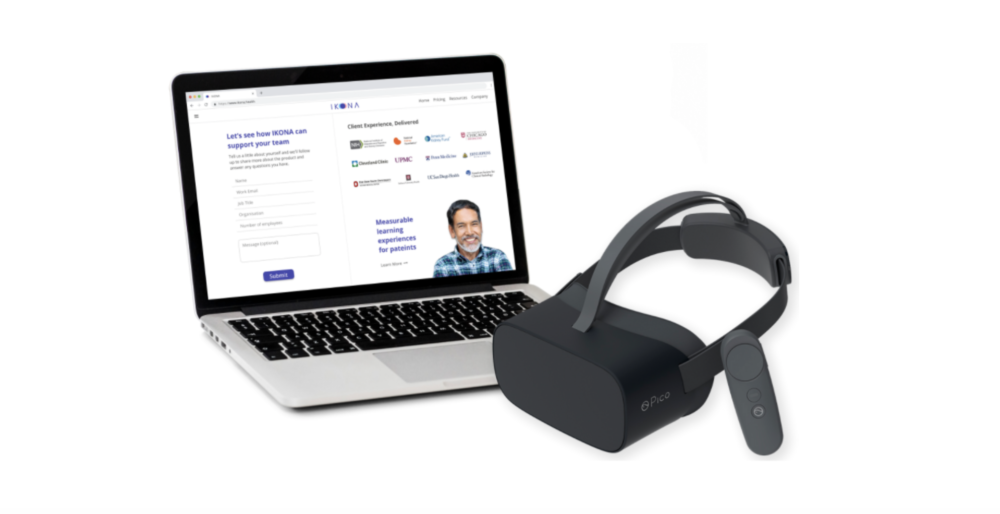IKONA Health
IKONA Health combines clinical expertise, science, technology and storytelling to deliver an interactive virtual reality healthcare simulation learning platform that is accessible on VR headsets (hardware provided) as well as on computers and mobile devices. Headquartered in New York City, IKONA Health provides a smarter way for kidney care providers to deliver effective and measurable learning experiences to their patients and staff.
Patients often struggle to find the right information, let alone to understand what all of the knowledge being presented to them means. According to IKONA Health, 15% of adults in the United States have kidney disease, 100 million adults have low health literacy, the average patient-doctor interaction lasts eight minutes and there are 50 or more daily patient visits per nephrologist. For these reasons, IKONA Health delivers readily available expertise in ways patients can learn from—and enjoy.
To do so, the company uses 360-degree video to create custom educational content relating to specific healthcare challenges, while incorporating simulated patients, film instructors and actors. Through a single platform, IKONA Health delivers powerful, interactive content with lasting education and health outcomes for providers of all sizes. The company’s approach combines industry insight, knowledge and neuroscience to deliver these highly effective learning tools at the point of care, while increasing patient safety.
Sponsored Content:
Helping to spread the IKONA Health mission and the use of company platform across educational environments, the company’s learning tools have been presented at a variety of medical simulation conferences, exhibitions and shows, such as those hosted by SimGHOSTS, INACSL, ASPiH, SESAM and the International Meeting for Simulation in Healthcare from the Society for Simulation in Healthcare.
About IKONA Clinical Simulation Learning
Founded in 2017, IKONA Healthcare started as a company to help patients facing uncertainty. Led by Department of Veterans Affairs patient Tim Fitzpatrick and two neurosurgeons, Kimon Bekelis, MD, and George Kakoulides, MD, the founders sought to transform the patient experience using tools like virtual reality. They continue to do so today, with a scientific board made up of advisers serving a vital role in the company’s efforts to stay at the forefront of kidney health.
IKONA Health believes that a focus should remain on effective delivery and measurement of educational interactions. The company uses decades of research and clinical expertise to reinvent how patients learn. Simultaneously, the IKONA Health platform helps kidney patients and health professionals understand treatment options and make confident decisions about their care.
Sponsored Content:
“The reality is, healthcare will never completely rid itself of uncertainty. And in the midst of significant demographic trends that will have far-reaching impacts on disproportionately growing populations of aging adults and patients managing chronic illnesses, our ideal future depends on ingenuity today,” Fitzpatrick wrote in a LinkedIn post. “Fortunately, we now possess the tools that might help bring about the changes that patients, their families, and providers will need in order to forge their paths through uncertainty.”
Facilitating such changes, IKONA Health is making patient learning, preparedness and overall confidence in their decision-making easier. The company says the overall mission is to reinvent learning in kidney care one experience at a time.
To achieve this, IKONA Health has developed a three-step approach to determining the optimal learning delivery model. The first step in this education solution is to identify the learning tasks. This involves familiarization, communication, machine training and decision support. According to IKONA Health, a good starting point is to determine whether the task is to learn (or memorize) information or facts and figures, to familiarize a patient or provider with a situation that is hard to verbalize or to learn some technical or motor skill.
The next step is to identify brain regions, including the identification of cognitive, behavioral, experiential and emotional learning systems. The cognitive system relies on the prefrontal cortex, with learning efficiency being limited by working memory and attentional processes. The experiential learning system encodes the rich context associated with learning, specifically the sights, sounds, smells and touches of every learning episode.
The behavioral skills learning system in the brain has evolved to learn technical and motor skills. The behavioral system links environmental contexts with actions and behaviors and does not rely on working memory and attention. The emotional learning system relies on the amygdala and other limbic structures. The detailed processing characteristics of this system are less understood than the cognitive and behavioral skills learning systems, but emotional learning strongly affects both cognitive and behavioral skills learning.
Lastly, the user must determine delivery, and whether the ideal delivery model is web-based, 360-degree video, virtual reality in simulation or augmented reality in simulation. As an example, IKONA Health explains that, if context-rich familiarization, such as experiencing a “day in the life” of a home dialysis nurse or peritoneal dialysis patient to help determine whether home dialysis is the right fit, then virtual reality with 360-degree video is necessary. Alternatively, if technical or motor skills learning is required, such as learning the skills needed to care for and maintain a broad range of home dialysis machines and devices, then interactive virtual reality in medicine or augmented reality is necessary.
Leveraging the Future of Healthcare Simulation
IKONA Health is constantly comparing learning performance across time and learning tasks. Analyzing education and familiarization as well as technical skills and motor skills helps patients and professionals thrive with better learning experiences.
Click Here to Connect to Leading Healthcare Simulation Vendors Like IKONA Health
When resources like online and print handouts are combined with the coordination of multiple care teams and conversations among multiple team members, the output results in consistent quality, controlled delivery, measurable learning and 24/7 virtual support.
Proving the success of IKONA Health to date, the company was granted a patient by the U.S. Patent Office for invention number 10,558,878 for the Pill Planner application, which was designed to help patients manage multiple medications by using augmented reality to guide the placement of pills into a patient’s pill box.
The idea for the Pill Planner was born several years ago when Hillary Bekelis, a nurse practitioner and IKONA Health’s head of clinical content, was working with kidney and liver transplant patients, the company says. Her patients and their families were struggling to manage their medications.
According to IKONA Health, with nearly half of all Americans taking prescription medications and 41 million taking five or more, tools like the Pill Planner will offer patients and their families the support they need where they need support most. Learn more on the IKONA Health website or read these articles below.
IKONA Health Simulation Education Latest News

15 Medical Simulation Companies You Need to Know About
Sponsored Content:














